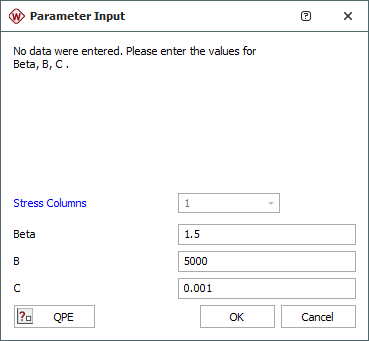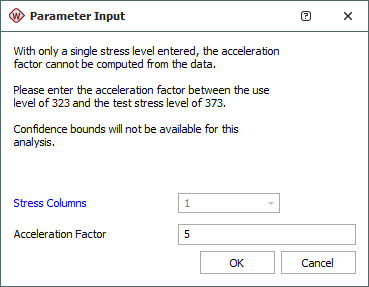Calculations with Insufficient Data Entered
For life-stress data only.
The Parameter Input window will appear when you attempt to calculate a life-stress data sheet that does not contain enough data to fit a model.
No Data Entered
If you attempt to calculate a data sheet in a life-stress data folio with no data entered, the Parameter Input window will appear, as shown next, and allow you to either enter the parameters for the selected Accelerated Life Testing model directly or use the Quick Parameter Estimator (QPE) to estimate the model's parameters based on information you have about the reliability of the product at normal and accelerated stress levels.

After you enter the parameters and click OK, the data sheet will be updated automatically with the specified model. Any plots or QCP results you produce from this data sheet will be based on this model.
Note: If you have more than one stress column selected to be used in the analysis and you attempt to calculate an empty data sheet using a proportional hazards or general log-linear model, the Columns drop-down list will be enabled in the Parameter Input window. With this drop-down list, you can select how many stresses to include in the model. You cannot choose to use more stresses than are selected to be used in the analysis.
Not Enough Stress Levels
To perform an accelerated life testing data analysis, you need information about how the product behaves at more than one stress level. If you select to use an Arrhenius, Eyring or inverse power law (IPL) model and attempt to calculate the data sheet with data for only one stress level, the Parameter Input will appear, as shown next, and ask you to specify an acceleration factor that allows the software to calculate how the product behaves at other stress levels.

The acceleration factor is obtained by dividing the product’s life at the use stress level by its life at the accelerated stress level used in the test. For example, if the product has a life of 100 hours at the use stress level, and it was tested at an accelerated stress level which reduces its life to 50 hours, then you would enter 2 in the Acceleration Factor field.
Note: This method of calculating the data sheet does not support confidence bounds.